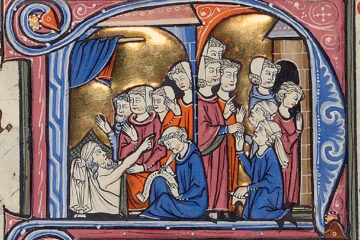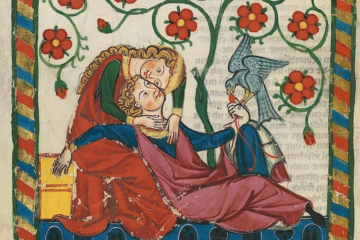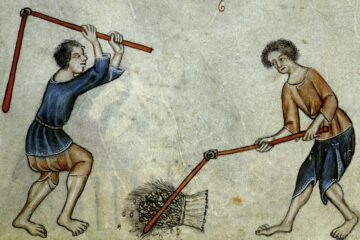Following the end of the Fifty Years’ War, what remained of the Kingdom of France was no more than a few disorganized and squabbling counties and duchies. King Philip II began the Restoration, a project meant to rebuild the kingdom after such a gruesome war, focusing specifically on major urban centers like Rosewood. King Philip “the Just” was level-headed, merciful, and pragmatic. Perhaps out of all the Sirius rulers, he had the most regal bearing. His heir, however, was prince Charles II, who would later be known as “the Conqueror”. He earned this title by restarting the Imperial Army, which had been a dying institution following the end of the war, marching it across Frankia, and claiming every duchy and county that was weaker than his own realm. With each conquest, his realm grew, as did the pockets of the Imperial Officers he installed. The Campaign of Unification began as a reclamation of a king’s birthright, a fight for honor and glory. With time, it devolved into a plunder of weaker lords’ lands and their subsequent subjugation. Before long, almost all of France had been united under one crown, one throne, one king.
By around 1200, with the turn of the century, King Charles II had been blessed with a new crown, scepter, and family sword. Not only this, but he also increased the lands he ruled through just war. The Restoration his father began paid off and he was seeing the results of the harvest; there was a population boom, an increase in trade, and the morale of the City was finally being rebuilt.
Among the King’s closest and most trusted Imperial Commanders were Marshals Berthold Bouclier, Johnathan Lassy, and Alexander Klopp. They were part of the King’s Imperial War Council during the campaign and effectively ran the army in his stead. Even after the war, Charles made sure to form an Imperial Council that consisted of the three Marshals who would manage the army in its entirety — recruitment, promotions, training, supplies, equipment, drills, deployment, discipline, strategy, and organization. The War of Unification proved very profitable for the King and his Marshals. It was so profitable, that after six years of relative peace, the Marshals grew tired of waiting for a new war and decided to take matters into their own hands.
On the first of March 1206, during the CXIX Grand Tournament, King Charles II Sirius opened the first day of the festivities in Fernyard Fortress. His entourage was organized by Marshal Berthold, who dismissed all his personal guards in favor of veteran Imperial soldiers. The leader of the entourage was Captain Jacob Levy. Behind the King, was his sister’s, princess Elanor’s, escort. It was headed by Jr. Officer Francis Winters. While the carriages were moving through the crowded streets of Rosewood, the convoy was brought to a halt by Marshal Johnathan. Imperial turncoats filled the street and took control of the people following the king’s party, making sure the civilians stayed out of it. Once the king left the safety of his carriage, he was stopped by Captain Jacob, who thrust his blade through Charles II. The crowd erupted in a panic as the rest of the party were slaughtered as well. It is said that Charles’ dying words were: “You’ve robbed us all.” As the king fell to his knees and bled out, Francis Winters realized what the “plan” was and proved his loyalty to the Crown by turning the carriage around and leaving the scene. Some loyalist Imperials joined him and they raced through the streets of Rosewood to get princess Elanor to safety. Their entourage rode to Alparis where the princess was granted refuge. Thus began the Age of Terror, with the death of France’s King.
Following the regicide committed by the Imperial Army, the Archbishop of Rosewood issued an official denouncement of the new Imperial leadership, excommunicating the three Marshal’s responsible for the coup. Regardless, the three formed what was known as “the Imperial Triumverate”, which was the governing body of Rosewood and its immediate area — everything that was seized by the Imperials. Initially, it was a council made up of the three marshals, all taking the title of “Imperial Consul”, with Johnathan being chosen as the Imperial Archon.
Their first course of action was to stabilize Rosewood. Catholicism, and all religions in general, were suppressed, as the Church vehemently opposed the murder of King Charles II, who was ordained by God Almighty to rule over all of France. The Triumvirate claimed that the King had become corrupt and planned to start another war against the German countries, which would have destroyed France.
Every legal offense during this time was punished harshly, with most criminals being executed by beheading, and their heads displayed on pikes. Jacob Levy was named a hero for killing the tyrant Charles II; he and some of his fellow Jewish officers received preferential treatment within the army because of it. The worst crime a man could commit was to speak ill of the Triumverate. The punishment was public disembowelment. The curfew was tightened. Women were prohibited from walking alone outside. People would report their neighbors for speaking ill of the Imperials and the next morning they would be gone. Imperial soldiers were, by law, exempt from any legal code. An Imperial soldier had the right to search anyone, enter any home, beat anyone, and take anything without cause. It was for the Imperial Cause. Anyone who was suspected of betraying it would be killed without mercy. Women were banned from the Imperial Army and their rights were curtailed; they could no longer walk outside without a man accompanying them, own businesses, request a divorce, wear revealing clothes, or wear work clothes. Members of the aristocracy who were suspected of being loyalists had their homes marked and attacked during the night. Most of the nobility was expelled from Rosewood during this time and their homes and holdings were seized by high-ranking Imperials.
The Mayor of Rosewood at the time, Lady Elizabeth Rosecroft was initially neutral in the conflict. However, as one year passed under the Triumverate, she began working closely with illegal elements from the criminal undercity of Rosewood. She started the resistance movement, commonly regarded as “the Children of the Rose” which is an old name dating back to a century ago. The resistance was headed by Elizabeth, who worked closely with Francis Winters, who came back to the Capital to liberate it, and Oliver Fitzwilliam, a young Norman noble who served as the late king’s page. The Children of the Rose were structured so that tracing the entirety of the organization was impossible if you captured just one. One member only ever knew their recruiter and two of their own recruits. Eventually, in 1207, Lady Elizabeth was betrayed by some of her handmaidens. She was stripped naked, forced to march down the Main Square, and beheaded. Her handmaidens were beheaded as well. Most of the Rosecrofts were executed as well, while a few managed to escape. This was around when public opinion started to shift from fear to agitation. Not soon after, Archon Johnathan ordered the execution of his fellow Consuls and positioned himself as the sole ruler of what local nobles called “the Rogue State of Rosewood”.
The resistance was mostly taken over by Lord Oliver Fitzwilliam. Men and women from all walks of life joined and carried out missions in secret against the Archon and his Imperials. These included sabotage, theft, urban guerrilla-style combat, slander, logistics disruption, etc. However, the main end they were working toward was sparking a revolt in Rosewood, one the Imperials couldn’t quell. June 18th 1208, they would get their wish.
Come the 18th of June, the Archon had ordered the immediate arrest and execution of Head Medicus, Mother Reanna. Mother Reanna was a highly popular figure in Rosewoodian politics, beloved by the people and respected by the clergy and nobility alike. It was her physicians that tended to the wounds of many Imperials as well. Archon Johnathan believed she was poisoning him as his health began to deteriorate. She was brought before the people in chains in the Main Square. When the Archon’s main enforcer, Jacob Levy, gave her the opportunity to confess to her crimes in exchange for a kinder death, she replied:
No bully, boor, or brute may command me. The Lord is my bastion, He is my strength. Faced against the wretched and the corrupt, I shall not falter.
The last words of Mother Reanna, Rosewood 1208 — later named a saint for her martyrdom.
Jacob forced her to kneel, but she refused and got up each time. Eventually, he kicked in her knee, preventing her from ever getting up again. When forced over the executioner’s block, she placed her hands on it in prayer. Jacob had to tie her hands behind her to force her into the right position. It took three swings to sever her head. Witnesses claim her lips were moving in prayer the entire time. While this was taking place, the people were booing, shouting, and demanding mercy. After her death, the people out on the streets refused to disperse and began calling for the Archon’s head. The Imperials present tried to maintain order until the first death took place. An innocent citizen was pierced with a spear and then all-out chaos broke out. The Imperials were easily overpowered and the crowd revolted. The Children of the Rose assumed control of the unruly masses and led them on a march toward Fernyard. Along the way, they faced minimal resistance. Few Imperials chose to run when faced with a group of over five thousand people. Most joined the resistance then. By the time they reached Fernyard’s bailey, there were around ten thousand people. Fernyard refused to open. The crowd pushed on the gate with makeshift battering rams until it gave way. Inside the bailey, there were 500-1000 Imperials loyal to the Archon willing to fight the people. Due to their advantageous position, the Imperials led the people into a slaughter as they could only pass through a narrow gate to assault the fortress. Eventually, after a few hours of slaughter, and nearly 2000 dead or wounded, the resistance broke through and killed/subdued the Imperials inside.
When the key figures of the resistance entered the fortress, they were met by surrendering Imperials and disillusioned officers leaving the castle. They went to the king’s chambers only to find a letter written by the Archon.
Watching them outside, calling for my head when I’ve taken so many of them is just rich. I ordered the death of Charles, I led the army against his enemies in his wars, I won that war for him, for all of us. They are fools to believe the church and their ideas of divine rule. Those who dare to take the reins should rule. Charles was a sadistic wimp who wouldn’t be called conqueror had I not won his war for him.
Everything I’ve done, I’ve done for the good of these people. Now, they march against me. Treason. If I could, I’d execute the whole pack of them. Like rats they scurry down the streets.
I know the laws of men cannot find me innocent, but I am only beholden to my Lord God. It will be in His name that I ask for absolution as I take my own life in fear of what they might do to me were they to find me alive.
In the end, I belong to no one and nothing. I stand alone in the darkness.
Written by Archon Johnathan Lassy, Imperial Marshal, Consul, and leader of the Rogue State of Rosewood moments before his suicide, Rosewood 1208.
The resistance leaders searched every room until they went out on the veranda where they found Johnathan in a pool of his own blood. He had fallen on his sword and chose a soldier’s death for himself. He was wrapped in the Imperial flag and carried out before the people with Oliver Fitzwilliam proclaiming that the Age of Terror is over and that the Monarchy has been restored. Princess Elanor was escorted back into Rosewood and later crowned the Queen of France.
The citizens of Rosewood grew to distrust the Imperial caste entirely after the final Imperial Uprising. Archon Johnathan’s actions put the final nail in the Imperial coffin. In 1210, Queen Elanor would disband the Imperial Army, hang all of its highest-ranking officers, and outlaw all of its supporters.
Rosewood in 1223, still recalls the events of the Age of Terror. They are spoken about with revolutionary zeal and great hatred for the Imperials. So the tool which guaranteed the freedom of the Sirius Empire under Torrino I finally came to an end after it had tried to seize the crown for itself.


